More than half of Latinos identify themselves as Catholic, while most of the remainder are closely divided between Protestants and those who say they have no religious affiliation.
Religious affiliation varies across Hispanic origin groups. Hispanics of Mexican and Dominican descent are more heavily Catholic than are other origin groups. Among Hispanics of Salvadoran descent, nearly equal shares are Catholic and Protestant.
There also are differences in affiliation between Hispanics who were born in the U.S. and those who were born outside the U.S. Foreign-born Hispanics are more likely than U.S.-born Hispanics to identify as Catholic. Foreign-born and native-born Hispanics are about equally likely to be Protestant, but the native born are more likely to be religiously unaffiliated.
The Religious Profile of Latinos
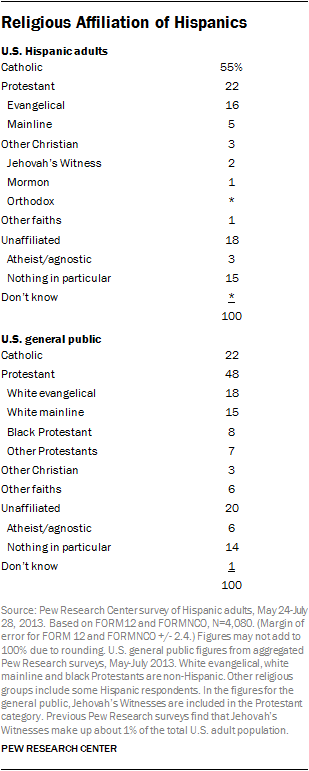 A majority of Latinos (55%) identify as Catholic, while most of the rest of the Latino population is roughly evenly divided between adherents of various Protestant traditions (22%) and those who are religiously unaffiliated (18%).
A majority of Latinos (55%) identify as Catholic, while most of the rest of the Latino population is roughly evenly divided between adherents of various Protestant traditions (22%) and those who are religiously unaffiliated (18%).
Hispanics are significantly more Catholic and less Protestant than is the public as a whole. The unaffiliated shares of the two groups are about the same.
Among Latino Protestants, there is a significantly higher proportion of born-again or evangelical Protestants than mainline Protestants (16% vs. 5%).
Three percent of Latinos identify with another Christian religion, including 2% who are Jehovah’s Witnesses.
Nearly one-fifth of Hispanics (18%) are not affiliated with any religion. This includes 3% who say they are atheist or agnostic and 15% who say their religion is nothing in particular.
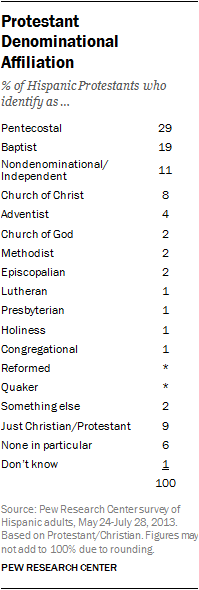 The Protestant tradition encompasses many denominational families, such as Baptists, Methodists, Lutherans and Pentecostals. When Latino Protestants are asked which denomination or church they identify with most closely, about three-in-ten (29%) say they are affiliated with a Pentecostal church, such as the Assemblies of God. This makes Pentecostalism the single largest denominational family among Latinos. About one-in-five (19%) identify as Baptist, and roughly one-in-ten (11%) identify with a nondenominational or independent Protestant church.
The Protestant tradition encompasses many denominational families, such as Baptists, Methodists, Lutherans and Pentecostals. When Latino Protestants are asked which denomination or church they identify with most closely, about three-in-ten (29%) say they are affiliated with a Pentecostal church, such as the Assemblies of God. This makes Pentecostalism the single largest denominational family among Latinos. About one-in-five (19%) identify as Baptist, and roughly one-in-ten (11%) identify with a nondenominational or independent Protestant church.
Differences by Hispanic Origin Group, Nativity and Generation
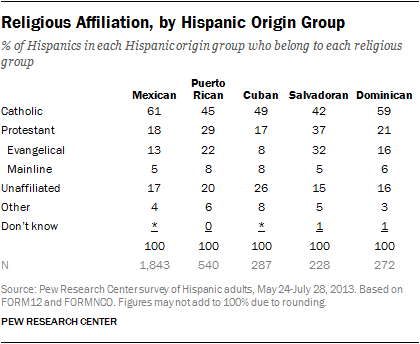 The religious profile of Hispanics varies by Hispanic origin group and nativity. Majorities of Hispanics of Mexican and Dominican descent identify as Catholic (61% and 59%, respectively). About half of Cuban Americans are Catholic (49%), as are 45% of Hispanics of Puerto Rican descent and 42% of those of Salvadoran descent. Among Salvadorans, there are nearly as many Protestants (37%) as Catholics (42%).
The religious profile of Hispanics varies by Hispanic origin group and nativity. Majorities of Hispanics of Mexican and Dominican descent identify as Catholic (61% and 59%, respectively). About half of Cuban Americans are Catholic (49%), as are 45% of Hispanics of Puerto Rican descent and 42% of those of Salvadoran descent. Among Salvadorans, there are nearly as many Protestants (37%) as Catholics (42%).
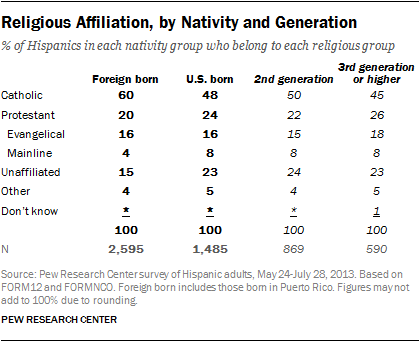 Six-in-ten foreign-born Hispanics are Catholic, compared with about half of the U.S. born (48%). By contrast, the native born are somewhat more likely than the foreign born to be religiously unaffiliated (23% vs. 15%). Roughly equal shares of both groups are Protestant (20% among foreign-born Hispanics, 24% among the native born).
Six-in-ten foreign-born Hispanics are Catholic, compared with about half of the U.S. born (48%). By contrast, the native born are somewhat more likely than the foreign born to be religiously unaffiliated (23% vs. 15%). Roughly equal shares of both groups are Protestant (20% among foreign-born Hispanics, 24% among the native born).
There are no significant differences in the religious profile of second- and third-generation Hispanics.
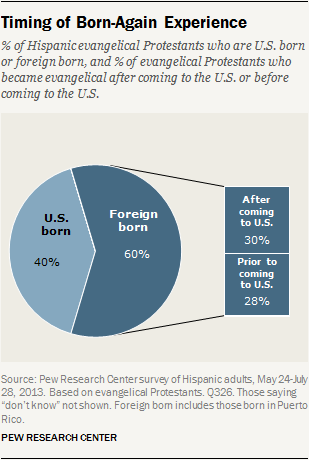
Evangelicalism Among Latinos
Evangelical Protestants outnumber mainline Protestants among Latinos by roughly three-to-one: 16% of all U.S. Latinos are evangelical Protestants, and 5% are mainline Protestants.
Among evangelical Protestant Latinos, a majority (60%) are foreign born. About half of the foreign born (30% of all evangelical Protestant Latinos) report that they became born-again or evangelical Christians after coming to the U.S. About as many (28% of all evangelical Protestant Latinos) say their born-again experience occurred prior to coming to the United States.
Demographic Profile of Religious Groups
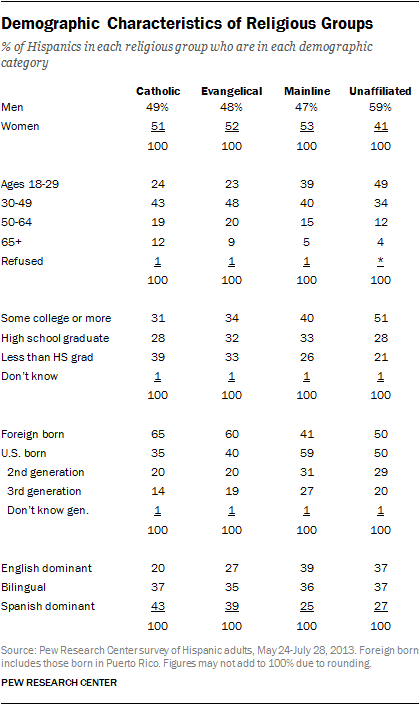 About two-thirds of Latino Catholics were born outside of the United States (65%), as were 60% of Latino evangelical Protestants. Fewer religiously unaffiliated Latinos (50%) and mainline Protestant Latinos (41%) are foreign born. Among the U.S. population as a whole, including children and adults, 13% are foreign born.
About two-thirds of Latino Catholics were born outside of the United States (65%), as were 60% of Latino evangelical Protestants. Fewer religiously unaffiliated Latinos (50%) and mainline Protestant Latinos (41%) are foreign born. Among the U.S. population as a whole, including children and adults, 13% are foreign born.
Latino Catholics and evangelical Protestants are also more likely to be Spanish-language dominant than either the religiously unaffiliated or mainline Protestants.
Religiously unaffiliated Latinos tend to be younger and more male compared with the other three major religious groups, and they also tend to have higher levels of educational attainment. About six-in-ten of the unaffiliated are men, while the gender balance among Catholics, evangelical Protestants and mainline Protestants is more evenly divided. While most Latinos in each of the major religious groups are under age 50, the unaffiliated and, to a lesser extent, mainline Protestants are even younger by comparison. Nearly half of unaffiliated Latino adults (49%) and about four-in-ten mainline Protestants (39%) are under age 30, compared with about a quarter of both Catholics (24%) and evangelical Protestants (23%).
Measuring Religious Change Among Latinos, 2006-2013
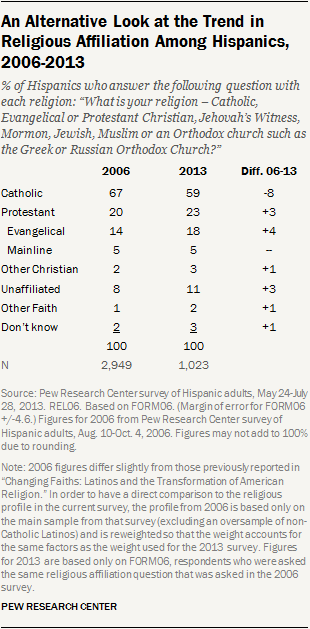
In 2006, the Pew Research Center conducted a major survey of Hispanics and religion. The question used to measure religious affiliation in that survey was different than the question that has been analyzed throughout this report. In the 2006 survey, the religious affiliation question was: “What is your religion – Catholic, Evangelical or Protestant Christian, Jehovah’s Witness, Mormon, Jewish, Muslim, or an Orthodox church such as the Greek or Russian Orthodox Church?”
This question worked well for measuring religious affiliation among Hispanics. But in the following year, Pew Research started to develop a large study of religion in the general public – the U.S. Religious Landscape Survey – at which point we adjusted our question measuring religious affiliation to better capture religious diversity in the United States, including the growing number of people who identify with no religion. The question used in the U.S. Religious Landscape Survey and in Pew Research surveys since then – including this survey of Hispanics – reads: “What is your present religion, if any? Are you Protestant, Roman Catholic, Mormon, Orthodox such as Greek or Russian Orthodox, Jewish, Muslim, Buddhist, Hindu, atheist, agnostic, something else, or nothing in particular?”
While most Hispanics in the current survey were asked this updated religious affiliation question (N=4,080), a subset of respondents in this survey (N=1,023) were asked the exact same religious affiliation question as respondents in the 2006 survey of Hispanics in order to permit a direct measure of change in religious composition since that time.
Using this “apples to apples” comparison, the share of Latinos who identify as Catholic has declined eight percentage points, from two-thirds (67%) in 2006 to about six-in-ten (59%) in 2013. The corresponding increases are about evenly distributed between Protestants, particularly evangelical Protestants, and those of no religious affiliation.


